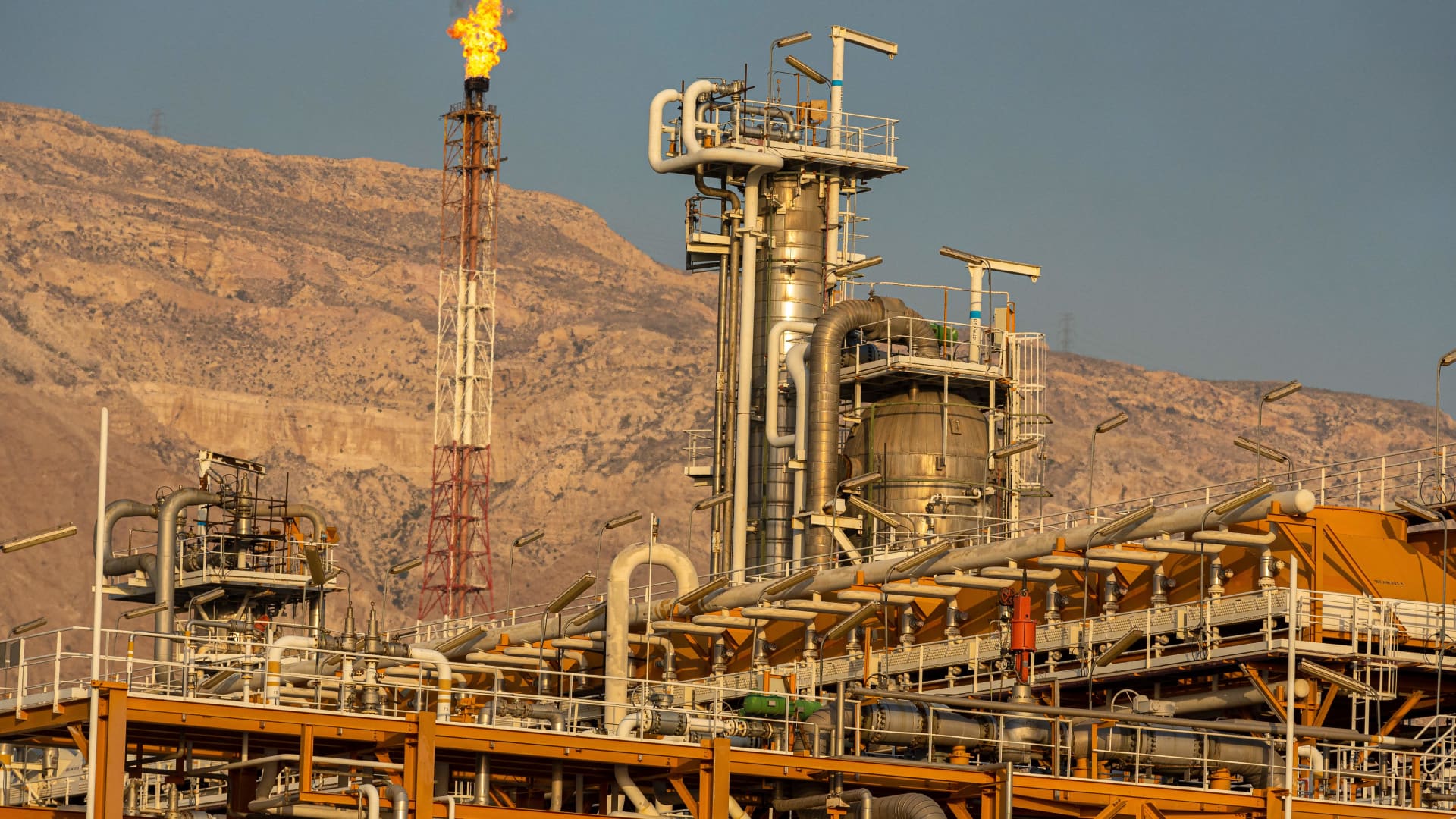A refinery from the north of the Persian Gulf in Iran.
Saeid Arabzadeh | Afp | Getty Images
Oil prices could soar to $100 per barrel and beyond, said market watchers, after Iran mounted an aerial attack against Israel reigniting fears of a regional war.
Iran is home to vast oil resources and is the third-largest producer in oil cartel OPEC. Any disruption in its capacity to supply global markets could send oil prices higher, analysts told CNBC. Markets will also closely monitor for developments or closure of the Strait of Hormuz, a key chokepoint which sits between Iran and Oman and through which one-fifth of global oil production flows daily.
“Any attack on oil production or export facilities in Iran would drive the price of Brent crude oil to $100, and the closure of the Strait of Hormuz would lead to prices in the $120 to $130 range,” said Andy Lipow, president of Lipow Oil Associates.
Iran fired over 300 drones and missiles on Israel on Saturday night, marking the first instance Iran launched a direct military attack on the Jewish state. A “vast majority” of the Iranian drones and missiles were intercepted, according to Israel Defense Forces spokesperson Rear Adm. Daniel Hagari. He said a 10-year-old girl was “severely injured by shrapnel,” but that there were no other casualties.
Insufficient investment makes supply more fragile and increases the chance of a super spike well above $100 if supply is disrupted.
Josh Young
portfolio manager at Bison Interests
Iran’s attack was in retaliation to an Israeli strike on its consulate in Damascus, Syria earlier this month. Iran accused Israel of bombing part of its embassy compound on April 1, killing seven Iranian military personnel, including three senior commanders.
Iran’s United Nations mission declared that following the aerial attack, the “matter can be deemed concluded.” It warned, however, that its response would be “considerably more severe” should there be further Israeli retaliation.
Compounded by underinvestment
Oil prices traded slightly lower in early morning trading in Asia. Global benchmark Brent slipped 0.31% to $90.17 a barrel Monday, while U.S. West Texas Intermediate futures fell 0.44% to trade at $85.28 per barrel.
Compounded by years of underinvestment in oil exploration and development, the recent geopolitical development renders global crude supplies more vulnerable, said Josh Young, portfolio manager at oil and gas investment firm Bison Interests.
“Insufficient investment makes supply more fragile and increases the chance of a super spike well above $100 if supply is disrupted,” he said.

Oil prices since the start of the year.
“I think oil prices will go to all time highs this cycle, due to a decade of under-investment in exploration and development,” Young added.
Oil faces a sizable natural decline in output. The decline rate for a conventional oil well is around 15%, absent any capital expenditure, according to Morgan Stanley’s estimates.
Oil prices have climbed in recent months on trade disruptions and delays caused by Red Sea maritime attacks from the Houthis, who claim solidarity with the Palestinian people.
Ramping up sanctions against Iran?
A dominant force in Middle East politics, Iran funds and supports groups opposing Israel, such as Palestinian militant group Hamas, Lebanon’s Hezbollah, Yemeni Houthis and Bashar al-Assad’s Syrian administration. The ongoing conflict in Gaza has often been referred to as a proxy war between Israel and Iran.
U.S. President Joe Biden condemned Iran’s attack on Israel, adding that Washington helped “take down nearly all of the incoming drones and missiles.”
“Our commitment to Israel’s security against threats from Iran and its proxies is ironclad,” Biden also said separately on social media platform X. But he also told Israel’s Prime Minister Benjamin Netanyahu that the U.S. will not participate in offensive operations against Iran, a senior administration official told NBC News.
If Iran further escalated hostilities, the U.S. and its allies would come under “renewed pressure to strengthen sanctions once again,” Betashares’ chief economist, David Bassanese, wrote in a note following the attack.
Iranian oil exports have lifted over the past few years with the U.S. “seemingly passively accepting this as a means to keep downward pressure on world oil prices,” he added.

